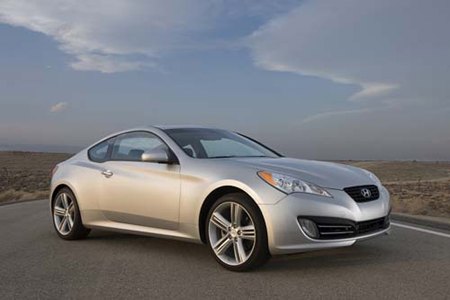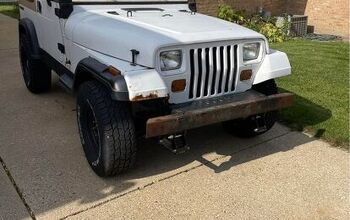Below the Radar No More: Hyundai/Kia Kick Ass

In the aftermath of Black Hole Tuesday (June ’08 sales numbers), a big story got lost in the vortex. Yes, The Big 2.8 tanked, Toyota and Nissan took hits to the jaw and Honda was proclaimed the new Messiah. But June’s unsung winner puts Honda’s accomplishments to shame. In the midst of a violently contracting U.S. new car market, Hyundai-Kia (“HK”) kicked ass. And that butt-whooping is a direct threat to Detroit’s survival.
Forget Honda’s 1.1 percent June increase. HK sakes jumped 3.5 percent; its best month ever. Its 28 percent profit growth in the first quarter dwarf’s Honda’s eight percent increase. Even more significantly, HK knocked Honda out of the global number five spot. And ominously for GM and Ford, Hyundai’s dramatic growth has become a crucial obstacle to success with their belated shift to smaller cars.
For decades, Toyhondissan has represented the evil empire eroding the reign of the house of Detroit. But as the Johnny-come-lately party crasher, Hyundai-Kia’s damage has been swift, surgically-precise and (potentially) deadly. HK’s share of the US market is up to 6.6 percent, surpassing Chrysler’s passenger car share (5.2 percent) and closing in on Ford’s 10.2 percent.
Hyundai’s Sonata handily outsold GM and Ford’s great white hopes, Malibu and Fusion. Add in the similar Kia Optima, and the HK twins are right at Altima levels (24k/month). Yes, HK’s larger SUV/CUV’s were not immune to the market shift, but their smaller cars more than made up the difference: Accent up 70 percent, Elantra up 50 percent.
And it’s not just the bigger and older brother in the family that’s hitting on all its (Tau V8) cylinders: Kia also had its best month ever, selling 28k cars, up 7.6 percent.
But the really big show is on the global stage, and that’s where HK is kicking serious butt.
HK is by far the fastest growing major car manufacturer, period. Rising from the number eleven slot in 1999, HK passed Nissan in ’05. In ’07, it passed Honda to join the ranks of the G5: Toyota, GM, VW and Ford. Although the jump from HK’s 3.9 million global units to Ford’s 5.9 million is daunting, don’t assume HK are happy where they are.
What’s driving HK’s industry leading global growth? Sheer will-forces, it would seem. The rapid Korean industrialization literally created the term “Asian Tiger.” And while Korea Inc. has clearly had Japan Inc. in its visor, Hyundai has Toyota in its. It may be indulging in stereotypes, but Koreans are noted for their stubborn and tenacious aggressiveness. Does that not perfectly describe Hyundai?
Here’s a company that boldly plunged into the U.S. market just over twenty years ago, setting records for a new brand introduction– only to have their hats handed to them over quality and reliability issues with the Excel. But they tenaciously stuck with their program of continuous improvements (I’m looking at you GM) to shed their shoddy image.
And now HK have an enviously complete line-up of cars and CUV’s including the rather remarkable rear wheel-drive Genesis sedan and Coupe (2009). Yes, TTAC’s review of the Genesis gave it three stars for its vanilla flavor. But the Genesis program is another substantial step forward. Keep in mind, Hyundai aspires to be the next Toyota, not BMW. In that context, the Genesis sedan is a remarkable accomplishment.
The Genesis Coupe raises the bar even higher: a potential segment buster; something that Toyota can only look enviously upon. And there’re more goodies in the pipeline: the Kia Soul looks a potential gen1 xB successor, and the Kia Forte just looks…good.
While HK has carved out an enviable and solid position in the US, its global growth and reach is much more dramatic. The new i10 is the hot new developing-world mini, having taken India by storm, capturing the I(Indian)COTY award.
Huge new factories are coming on-line in China and India, and the rest of the world is booming for Hyundai. The i30 compact has been a substantial success in the difficult European market, with Golf-competitive looks and dynamic qualities. HK claims to have the most balanced global position of the Big Global 5. Their home market is still healthy, unlike the Japanese, US and increasingly, the European, markets.
Hyundai’s meteoric rise is another nail in the coffins of GM and Ford, both globally and domestically. HK is growing substantially faster in the developing world, blunting Detroit’s ambitions for profits abroad. Closer to home, Hyundai is part of Toyhondisshyunkia: a solid bloc controlling almost 50 percent of the U.S. passenger car market.
Ford’s coming Euro-global car line-up looks appealing. GM is… working on theirs. But will car buyers care enough to generate the market share, volumes and profits they desperately need? “Thanks” in part to Hyundai, I wouldn’t count on it.

More by Paul Niedermeyer
Latest Car Reviews
Read moreLatest Product Reviews
Read moreRecent Comments
- Daniel J Cx-5 lol. It's why we have one. I love hybrids but the engine in the RAV4 is just loud and obnoxious when it fires up.
- Oberkanone CX-5 diesel.
- Oberkanone Autonomous cars are afraid of us.
- Theflyersfan I always thought this gen XC90 could be compared to Mercedes' first-gen M-class. Everyone in every suburban family in every moderate-upper-class neighborhood got one and they were both a dumpster fire of quality. It's looking like Volvo finally worked out the quality issues, but that was a bad launch. And now I shall sound like every car site commenter over the last 25 years and say that Volvo all but killed their excellent line of wagons and replaced them with unreliable, overweight wagons on stilts just so some "I'll be famous on TikTok someday" mom won't be seen in a wagon or minivan dropping the rug rats off at school.
- Theflyersfan For the stop-and-go slog when sitting on something like The 405 or The Capital Beltway, sure. It's slow and there's time to react if something goes wrong. 85 mph in Texas with lane restriping and construction coming up? Not a chance. Radar cruise control is already glitchy enough with uneven distances, lane keeping assist is so hyperactive that it's turned off, and auto-braking's sole purpose is to launch loose objects in the car forward. Put them together and what could go wrong???


































Comments
Join the conversation
It's a crying shame that Daewoo isn't around to enjoy this. I've always liked how their car names (Leganza, Nubira) sounded reminiscent of deadly African viruses. No really.
[...] Below the Radar No More: Hyundai/Kia Kick Ass | The Truth About Cars [...]